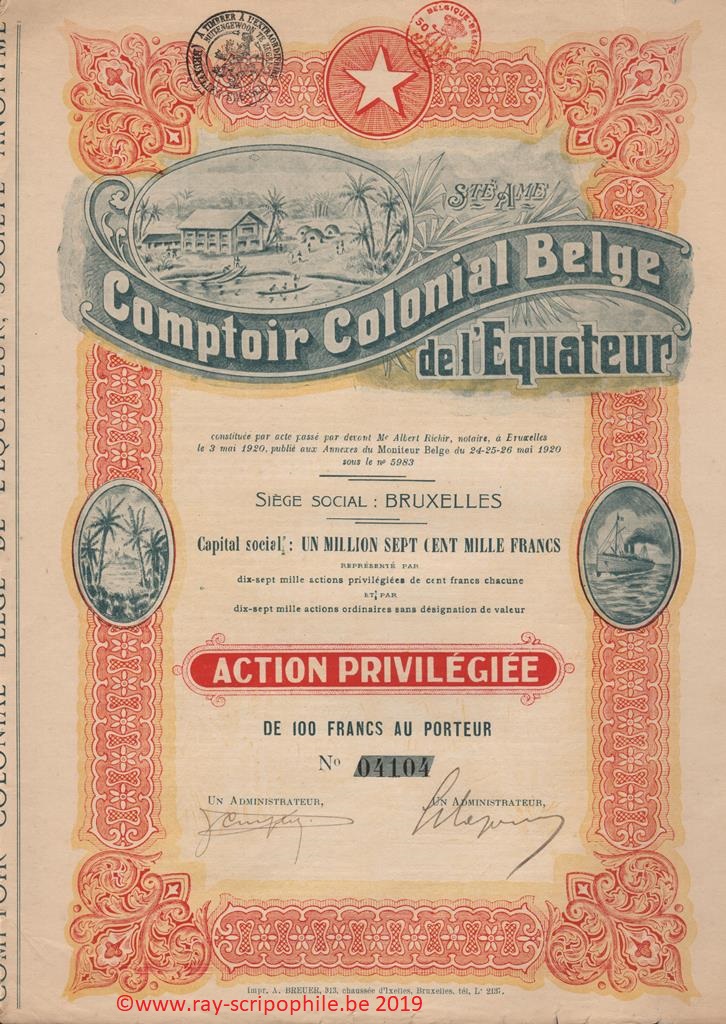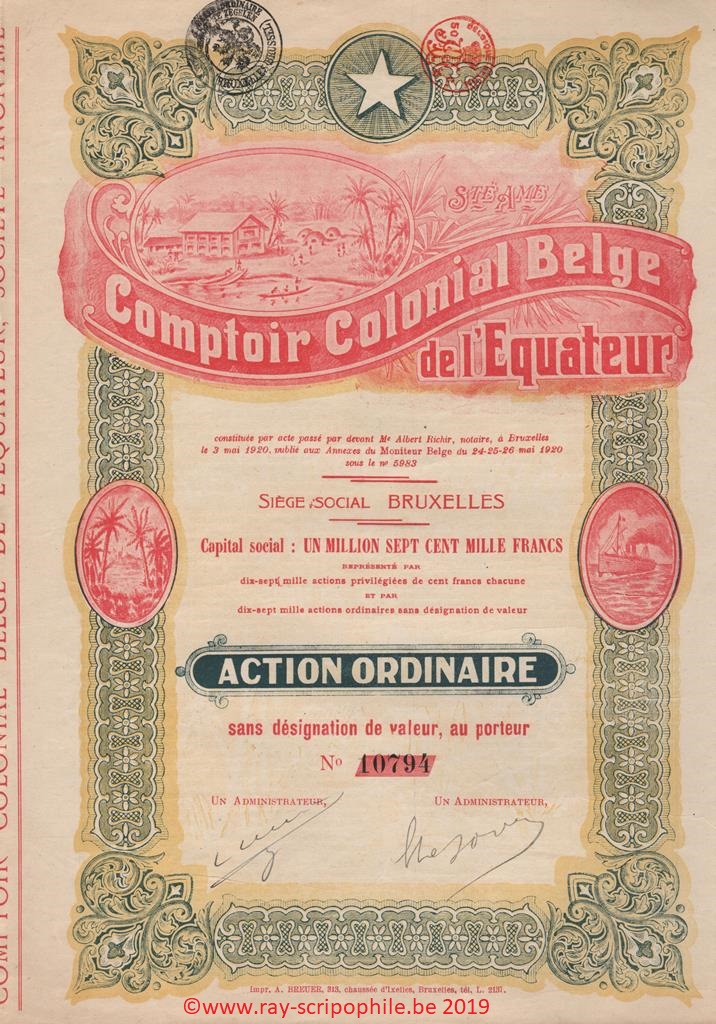Comptoir Colonial Belge de l'Equateur S.A.
Constitution
The S.A. Comptoir Colonial Belge de l'Equateur was incorporated on May 3, 1920, with a capital of one million seven hundred thousand francs; this capital was represented by 17,000 preferred shares of 100 francs and by 17,000 ordinary shares without value designation. The registered office was established in Brussels (1).
The preference shares were subscribed as follows:
Messrs. Joseph Antoine, 100 shares; Ernest Cordemans, 1,300 shares; Henri Cordemans, 1,100 shares; Alexandre Cooreman, 40 shares; Joseph Couplet, 5,500 shares; Ernest Doneux, 100 shares; Emile Duwez, 50 shares; Arthur Eliot, 100 shares; Arthur Fichefet, 650 shares; Jean Fichefet, 100 shares; Jean Lambo, 200 shares; Robert Lang, 200 shares; Joseph Legros, 250 shares; Léon Lejour, 1,395 shares; Edouard Lowet, 50 shares; Albert Marchant, 100 shares; Eugène Mulle, 200 shares; Gustave Mulle, 1,125 shares; Michel Nicaise, 500 shares; Constant Nys, 100 shares; Emile Nys, 100 shares; Eugène Nys, 100 shares; Jean Nys, 50 shares; Guillaume Petitjean, 300 shares; Franz Peeters, 500 shares; Georges Poupart, 160 shares; Paul Revelard, 600 shares; Eugène Reysman, 50 shares; Edouard Bergeys, 50 shares; Louis Stouffs, 100 shares; Léon Theodor, 50 shares; Léon Thiery, 150 shares; Fernand Thiry, 100 shares; Jean Vandevelde, 150 shares; Gustave Van Roye, 100 shares; Henri Vereycken, 80 shares; Herman Windfohr, 200 shares and the Compagnie Sucrière Européenne et Coloniale, 1,000 shares.
The shares were paid up at the subscription of 20%; the sum of 340,000 francs was at the disposal of the Company.
One ordinary share was allotted for each subscribed and paid-up preferred share (33-(24-25-26/05/1920)-5983).
From November 26 to 29, 1921, 6,000 preferred shares were put on sale by public subscription at a price of 130 francs per share (21-(1926 T1)-809/10).
First Board of Directors
Following the incorporation of the Company, the EGM fixed the number of directors at six for the first time, namely:
Messrs. Arthur Fichefet, Léon Thiery, Joseph Legros, Henri Cordemans, Léon Lejour-Minne, Joseph Couplet.
And fixed the number of commissioners at four, namely:
Messrs. Michel Nicaise, Paul Revelard, Edouard Sergeys, Jean Vandevelde (33-(24-25-26/05/1920)-5983).
Object
The production, the exploitation, the purchase, and the sale of products of any nature, in all the countries and especially in Congo.
The constitution of special companies to develop its object or part of this object, as well as all contributions of part or all its assets or the transfer of rights belonging to it, to other companies, persons, or enterprises.
The participation or the financial intervention in all companies or enterprises existing or to be created which would be likely to support its social purpose.
All commercial, industrial, mining, agricultural, real estate, financial and other operations, within the widest limits, which are directly or indirectly related to its object, or which are likely to promote or extend its development (1).
Change of capital, event(s), shareholding(s), dividend(s), quotation
The Company established factories in Coquilhatville, Wangala, Monieka, Boende, Gombe Malala, Wema, Bokone, Balangala and Bolomba in the Belgian Congo. It had stores in Antwerp and dealt with the direct import of copal gum, palm nuts and oil, ivory and in general all products originating from equatorial Africa.
The first fiscal year was satisfactory in spite of the crisis affecting the colonial business.
The results of the 1921 fiscal year were more favorable. The production of the various counter was significantly improved, and sales of African products were made at more remunerative prices (21-(1926 T1)-809/10).
The following years' activities were hardly flourishing; as a result, in 1924, the Board decided that it was in the shareholders' interest to continue the talks with the Compagnie du Congo Belge with a view to resuming business in Africa. These negotiations were successful and all the assets in Africa were transferred to the Compagnie du Congo Belge in exchange for 5,200 shares in the Compagnie du Congo Belge. The takeover operations began on August 12, 1925 (21-(1927 T1)-611).
The Company remained active in gum copal and colonial products until 1932, thereafter no more information until its early dissolution.
Dissolution and liquidation
The EGM of May 12, 1941, decided the early dissolution and the liquidation of the Company. (33-(30/05/1941)-8709). In the balance sheet of December 31, 1941, a liquidation distribution of thirty francs for the preferred shares of 100 francs is mentioned (33). On some preference shares, a stamp shows the mention of the distribution.



